Call: (510) 534-0706
General Dentistry
Dental Exam
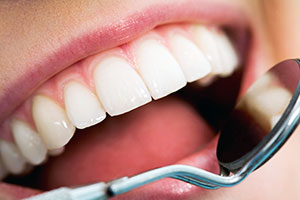
There's nothing to fear with a dental exam. Your teeth will be visually examined for signs of plaque, tartar and tooth decay. Your gums will also be examined for puffiness or discoloration, which are signs of gum disease. A full set of dental X-rays may also be taken during your dental exam, to enable your dentist to see below the surfaces of your teeth. Dental exams typically end with a dental cleaning, to remove surface stains and buildup.
Teeth Cleaning & Consultation

That's why dentists recommend that teeth be cleaned professionally twice a year. Teeth cleaning is the removal of dental plaque and tartar in order to prevent cavities, gingivitis and gum disease. The average dental cleaning is a routine procedure that is rarely painful and takes 30 to 45 minutes.
At East Bay Family Dentistry, we specialize in and frequently perform a variety of dental cleaning procedures, from scaling to whitening, so you can rest assured that yours will be performed by a skilled and experienced medical professional.
Composite Fillings
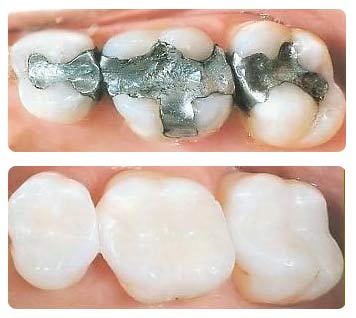
But today, you can get your cavities, as well as any other smaller hollow areas in your teeth, filled with composite fillings. Composite fillings are made from resins that are matched to your tooth's color - so they become invisible when applied.
Composite fillings also provide an excellent seal on the affected area, so that tooth decay can be prevented. The factors that go into our decision to use composite fillings include:
- The size of the area that needs to be filled
- The location of the affected area in the mouth (i.e., a tooth that is heavily relied on for chewing)
- Allergies the patient may have
- The preference of the patient regarding the use of metals in the mouth
- Whether it is necessary cosmetically to have a tooth-colored filling
Dental Crowns
Depending on the type of treatment you have received for your dental problem, it might be necessary to:
- Have your tooth restored to its original size and shape
- Supply additional physical support for the treated tooth
- Get a complete "makeover" on the affected tooth
- For cases like these, a crown is the most logical option.
While inlays and outlays cover the chewing surface of the tooth and fillings fill in the empty interior space of the tooth, crowns completely cover every visible part of the tooth - which is why they are sometimes referred to as "caps." A part of your tooth remains but is essentially "rebuilt" to resemble the tooth at its exterior best.
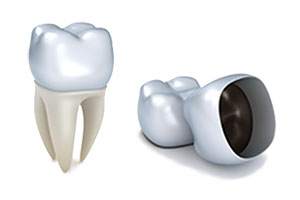
While porcelain crowns certainly can improve the look of a tooth or multiple teeth, it is recommended only in conjunction with prior repair of the tooth - not simply for cosmetic purposes.
For more information or to receive a free consultation, please contact us today.
Dental Bridges
Having one or more missing teeth can have a serious effect not only on your smile, but also on your dental health. Specifically, missing teeth can cause:
- A shift in the alignment of your teeth
- Increased risk of periodontal disease
- Increased risk of tooth decay
- Loss of adjacent teeth
- Speech disorders
- Temporomandibular joint disorder (TMJ)
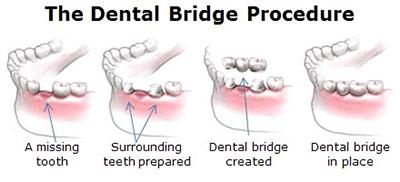
Like dental implants, dental bridges are used to replace a missing tooth, except bridges are supported by the teeth on either side called abutment teeth.
What Are the Benefits of Bridges?
Like many cosmetic dental procedures, placing bridges also serves a restorative purpose. A dental bridge will improve your ability to chew and speak as well as your smile. In a recent study published in the Journal of the American Dental Association, dental bridges were shown to dramatically reduce the risk of losing teeth that are adjacent to a missing tooth. In addition, dental bridges can help keep your jaw and face from changing shape, as they tend to do when a person has missing teeth.
What Types of Bridges Are There?
Cantilever bridges are used to replace a tooth that does not have supporting teeth on both sides of the affected area.
Maryland bonded bridges include artificial teeth and gums, and are held in place by a metal frame.
Traditional bridges are the most common, and literally bridge the gap of an empty tooth space by securing a false tooth using crowns on the teeth on either side.
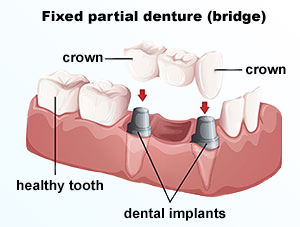
The procedure of installing a dental bridge is typically completed in two visits. First, your dentist will determine if you are a good candidate for a dental bridge. If you are, your teeth will need to be prepared by reshaping or reconstructing any badly decayed or damaged areas. Afterward, your dentist will take an impression of your teeth, which is then sent off to a lab where it is cast into a mold, and give you a temporary bridge to wear. On your second visit, this mold will be fitted to your teeth, and any necessary corrections or adjustments will be made on that same visit.
How Long Do Dental Bridges Last?
Dental bridges can last from 8 to 15 years and can last even longer if you maintain good oral hygiene by brushing and flossing regularly.
How Much Do Bridges Cost?
Depending on various factors such as the experience and skill level of the dentist and the type of bridge being fitted, dental bridges can cost anywhere from $250 to $2500 a tooth.
Are Bridges Covered By My Dental Insurance?
Dental bridges are typically partially covered by insurers. Ask your dentist to find out exactly how much you will have to pay out of pocket.
To find out more about bridges or to schedule an appointment, call East Bay Family Dentistry today!
Dentures
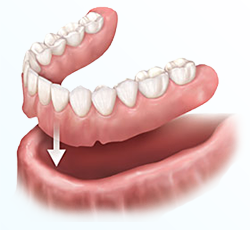
Implant dentures solve these issues. Implant dentures are a type of overdenture that is supported by and attached to implants. They provide tremendous support and fixation so you can comfortably speak, chew, and smile. They keep your upper and lower jaw bone from receding which prevents facial shape changes like the "shrunken" look.
An implant denture is used when a person doesn't have any teeth in the jaw, but has enough bone in the jaw to support implants. They have special attachments that snap onto attachments on the implants.
To discuss your implant denture options, call us for an appointment today!
Oral Surgery & Extractions
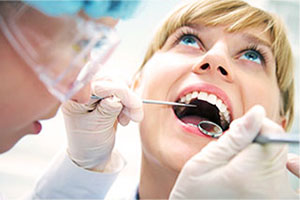
At East Bay Family Dentistry, we always make every attempt to treat your teeth and remedy any dental malady. If the damage to your teeth is extensive, then it may be necessary to extract one or more teeth in order to maintain dental health.
If a tooth is broken, cracked or extensively decayed it may be necessary to remove it. Likewise, a tooth that is associated with advanced stages of periodontal disease should be removed, as well as teeth that are poorly positioned or non-functional.
Whatever the cause, you can rest assured that East Bay Family Dentistry will carefully explore and inform you to any other options before making the decision to remove a tooth. Should tooth extraction become necessary, you are assured the nurturing care that comes with any East Bay Family Dentistry procedure. We understand that the process of having a tooth extracted can be daunting and make every attempt to keep you comfortable throughout the procedure.